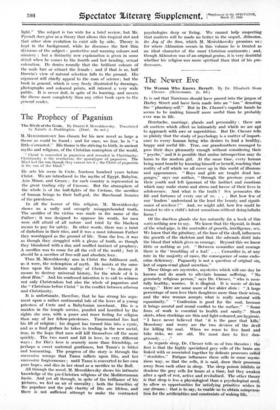The Newer Eve
The Woman Who Knows Herself. By Dr. Elizabeth Sloan Chesser. (Heinemann. 2s. 6d.) IT is sad that Narcissus should have passed into the jargon of Harley Street and have been made into an " ism " denoting the " phantasy-self." But in Dr. Chesser's capable hands he seems to be making himself more useful than he probably
ever was in life. .
Heartache, marriage, glands and personality : these are all matters which affect us intimately and which we are apt to approach with awe or superstition. But Dr. Chesser tells us plainly that the study of psychology is a matter of import- ance to every- human being who desires to lead a healthy, happy and useful life. True, our grandmothers managed to pass their days pleasantly enough without considering their " psyche," and it is possible that, undue introspection may do harm to the modern girl. At the same time, every human being must benefit by knowing himself or herself, reaching that reality of self which we all cover up in this world of illusions and appearances. Boys and girls are taught dead lan- guages," says our author, " through the precious years of their youth and left ignorant of the instinct and emotions which may make storm and stress. and havoc of their lives in adolescence. And what is the truth ? Sex permeates the life and fortunes of every one of us. . . . But how few of our ' leaders ' understand in the least the beauty and signifi- cance of sex-love ! " And, we might add, how few could be trusted to stir a child's latent sensations without doing infinite harm !
Of the ductless glands she has naturally (in a book of this sort) nothing new to say. We know that the thyroid, in front of the wind-pipe, is the controller of growth, intelligence, sex. We kiiow that the pituitary, at the.base of the skull, influences the growth of the skeleton and that the adrenals distil into the blood that which gives us courage: Beyond this we know little or nothing as yet. Between cowardice and courage there is the trembling of a leaf.' . . . Cowardice is, at any rate in the majority of eases, the consequence of some endo- crine deficiency. Pugnacity is not a question of original sin, but of supra-renal gland secretion."
These things are Mysteries, mysteries which will one day be known and do much to alleviate human suffering. No genuinely religious person," says Dr. Chesser, " who is men- tally healthy, worries. It is illogical. It is waste of divine energy." Here are some more of her obiter dicta : A large percentage of men love their daughters more than their-wives, and the wise woman accepts what is really natural with equanimity." " Confession is good for the soul, because it brings mental and moral conflict to the surface." " Some form of- work is essential to health and sanity." Short skirts, when stockings are thin and light-coloured, are hygienic.
I have never believed that it is the pace' that kills.' Monotony and worry are the two devices of the devil for killing the soul. When we cease to live hard and take risks, we are old. We must dare to live dan- gerously. . . ."
As regards sleep, Dr. Chesser tells us of two theories : the first is that the highly specialized grey cells of the brain are linked with or associated together by delicate processes called " dendrites." Fatigue influences these cells in some myste- rious way, so that the cells, it is said, draw their processes away from each other in sleep. The sleep poison inhibits or deadens the grey cells for hours at a time, but they awaken after a spell of rest, active and revitalized. The other theory is that sleep is less a physiological than a psychological need, to allow us opportunities for satisfying primitive wishes in our dreams : that is to say, to enable us to obtain compensa- tion for the artificialities and constraints of waking life.






















































 Previous page
Previous page